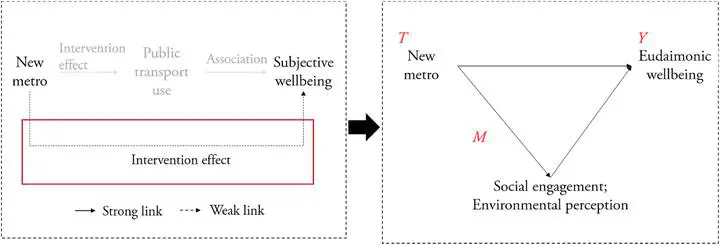Causal mediation analysis of social and environmental factors in pathways from a metro intervention to eudaimonic wellbeing among older people
 Figure 1. Conceptual Model
Figure 1. Conceptual ModelAbstract
Background
This research aims to unravel the pathways linking transport with eudaimonic wellbeing among older people, considering the mediating role of social and environmental factors.
Methods
We focused on outcomes across six dimensions of eudaimonic wellbeing:/ self-acceptance, autonomy, positive relations with others, environmental mastery, purpose in life, and personal growth. Using a new metro line as a natural experiment, we collected cohort data of 449 older adults before and after the opening of a new metro line. The treatment group consisted of participants living within the 400-m buffer zones surrounding the new metro stations, while the control group consisted of those living in comparable station catchments. The mediators include social engagement and environmental perception. We first used difference-in-difference (DID) models to estimate the metro’s direct influence on these eudaimonic elements. Causal mediation analyses were then conducted to delved into how the social and environmental factors mediated these effects.
Result
The new metro enhanced the treatment group’s environmental mastery, life purpose, and self-acceptance (p < 0.05). These improvements were partly attributed to promoted social engagement and improved environmental perceptions triggered by the metro development (p < 0.05). Notably, the environmental perceptions demonstrated a stronger mediating effect than the social factors.
Discussion and conclusion
Transport interventions could effectively counteract the age-related eudaimonic decline. The enhancement of environmental perceptions played a key role in the effectiveness of the metro intervention. Our findings contribute to the understanding of casual mechanisms of transport and wellbeing which is vital for developing transport policies and projects that address the needs of an ageing population."